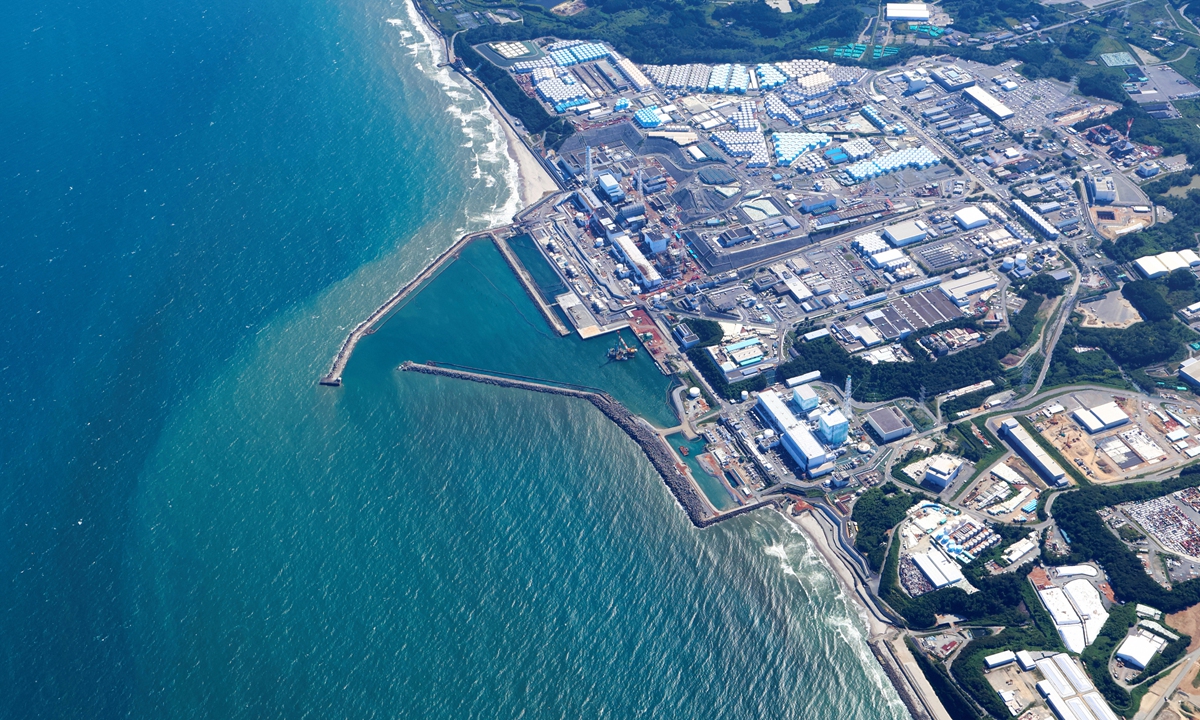
In this aerial image, nuclear-contaminated water is released from the Tokyo Electric Power Co (TEPCO) Fukushima Daiichi nuclear power plant into the ocean on August 24, 2023 in Okuma, Fukushima, Japan. Photo: VCG
Multiple coastal cities including Wenzhou in East China's Zhejiang Province and Guangzhou in South China’s Guangdong Province and Sanya in South China’s Hainan Province have launched emergency monitoring on maritime environment and aquatic food over Fukushima contaminated water dumping to safeguard China’s marine environment.
The South Zhejiang Institute of Radiation Medicine and Nuclear Technology in Wenzhou, East China's Zhejiang Province, established a special working group of marine radioactive pollution monitoring for the East China Sea last Friday after Japan started dumping Fukushima nuclear-contaminated wastewater.
The group will conduct real-time monitoring of the nuclear-contaminated seawater area and have preliminarily planned to carry out sampling and monitoring in the sea area every two months to promptly respond to and monitor the potential impact of Japan’s Fukushima nuclear-contaminated wastewater on the East China Sea, Wenzhou Daily reported on Sunday.
According to Wan Xinlong, leader of the special working group, the institute has been proactively conducting background radiation investigations of marine radioactive pollution in the relevant sea areas in response to potential pollution risks caused by the discharge of Fukushima nuclear-contaminated wastewater since last year. They have so far conducted two rounds of background radiation investigations, and their technical expertise and monitoring capabilities have become relatively mature.
“As of present, the levels of nuclear radioactivity in seawater, marine creatures, and seabed sediments collected from offshore areas are all within the range of natural background radiation levels and the nuclear-contaminated wastewater has not yet had an impact on the coastal areas of Wenzhou,” Wan said.
Wan noted that in order to comprehensively understand the distribution and trend of radioactive pollution, the originally planned quarterly sampling and monitoring will be shortened to every two months. The third round of sampling is scheduled to take place this September, with a larger sampling area compared to the previous two rounds.
The special working group will focus on monitoring marine radioactive pollution in the East China Sea region, with increased monitoring frequencies and enlarged monitoring ranges and strengthened collection and monitoring of samples such as seawater, marine creatures and sediments in a bid to promptly master the concentration and changes of radioactive pollutants in the ocean.
A team from Tsinghua Shenzhen International Graduate School created
a diffusion model of radioactive materials on the ocean scale from macroscopic and microscopic perspectives respectively to simulate the long-term effects of the Fukushima nuclear-contaminated wastewater dumping program, according to which the nuclear pollutants will reach the coastal waters of China 240 days after being initially dumped, and will reach the coast of North America and cover almost the whole North Pacific Ocean in 1,200 days.
According to Wan, apart from the institute, domestic relevant departments and institutions are closely monitoring the radiation situation in China’s coastal areas. And they are ready to take immediate measures in case of any abnormal situation.
Wan noted that portable radiation detectors can only detect whether there is hazardous radiation on the surface of objects or in the air but can’t detect the presence of pollutants inside the objects.
Besides, these radiation detectors require a high level of expertise for accurate operation. Even a slight deviation could lead to inaccurate measurement. Thus, it is not recommended for the general public without proper knowledge and guidance to buy these detectors.
Guangzhou Center for Disease Control and Prevention (CDC) as well as the Guangzhou Food Safety Risk Monitoring and Evaluation Center said the center will proactively carry out emergency monitoring over Fukushima contaminated water dumping and will continue to monitor the situation of artificial radioactive pollution in seafood products sold in Guangzhou to safeguard food safety in the city, Guangzhou Daily reported on Sunday.
The Guangzhou CDC reminds residents to pay attention to authoritative information released by government departments and not to believe rumors or unreliable information that could cause unnecessary panic. They also advised to avoid purchasing or consuming food produced in areas affected by radiation contamination. When traveling to Japan, it’s not recommended to buy local seafood products or food items from unknown origins for gifting to relatives and friends back in China to reduce the chance of consuming nuclear-contaminated foods.
To prevent food products from radiation-affected areas in Japan from entering Sanya city in South China’s Hainan Province, the local market supervision bureau conducted thorough inspections over the weekend on the city's supermarkets, wet markets and other food production and distribution units to ensure they are not using or selling food products or food ingredients originating from nuclear radiation-affected areas in Japan, the bureau announced on Sunday.
The market watchdog will continue to intensify inspections of food production and sales companies, especially those dealing with imported and frozen foods to rigorously prevent substandard food products from entering the market.
China’s General Administration of Customs banned import of all aquatic products originating from Japan starting from August 24, 2023, when Japan started dumping nuclear-contaminated wastewater from crippled Fukushima Daiichi nuclear power plant into the sea.
The National Nuclear Safety Administration of China's Ministry of Ecology and Environment (MEE) on August 24, 2023 announced that relevant departments are
organizing the marine radiation environment monitoring of China's jurisdictional sea areas in 2023.
The MEE said it will continue to strengthen relevant monitoring work and promptly follow and assess the potential impact of the discharge of nuclear-contaminated water from the Fukushima nuclear plant on China’s marine radiation environment.
Global Times




